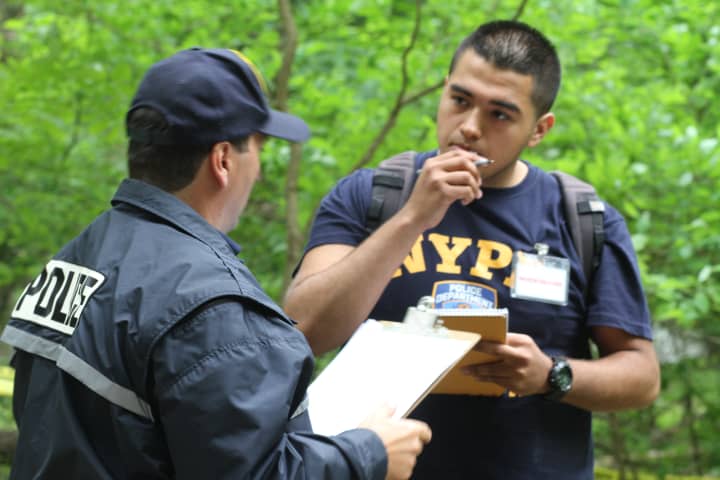The students, who spent the year studying the ins and outs of forensic science, were brought out to the Nature Study Woods on Wednesday, May 28, to examine crime scenes staged by Rubins, along with New Rochelle police officers and volunteers.
The students were divided across six staged crime scenes and asked to search for and collect evidence, take measurements, snap photographs, examine fake dead bodies and ultimately discern what had occurred at the scene -- all in 55 minutes.
Rubins and the police officer assigned to the scene both graded them using an established rubric.
Rubins, who has taught the class for 17 years, said the class was originally created in the mid-1980s to instill critical thinking and processing skills in students, while also offering a fun alternative to standard science classes.
He said the class uses a combination of biology, chemistry and physics to teach students how real forensic scientists and law enforcement officers examine crime scenes and track down murderers.
“Basically, I teach them about what the guys on 'CSI' and other shows like it do, but in a real way," he said. "Over the years I’ve tried, and succeeded, to not just do things the high school way. Sometimes it's challenging and complex, but if we can do things the way the real professionals in the field do it, I’d rather do it that way."
According to Rubins, many of his students move onto law enforcement, while a smaller amount end up pursuing forensic science in college.
One of those students is Kristen Head, 26, formerly of New Rochelle and now of Norwalk, Conn. Head graduated New Rochelle High School in 2006 and moved on to pursue her bachelor's and master's degree in Forensic Science at Cedar Crest College.
Now, Head works in marketing human body identification products.
She said she believes the class can benefit students interested in science by showing them the reality of forensic science, debunking the glamorous and dramatic myths employed by shows like CSI.
As for students who aren’t interested in pursuing science, she said the course can benefit them in different but equal ways.
“Even the students who might go on to pursue English or one of the other liberal arts, this class can teach them valuable critical thinking skills and a different way of looking at the world,” she said.
@suzannesamin
ssamin@dailyvoice.com
Click here to follow Daily Voice New Rochelle and receive free news updates.





